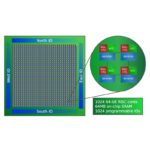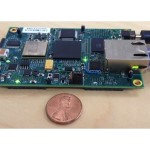Over at the Parallella Blog, Andreas Olafsson from Adapteva writes that the company has reached an important milestone on its next-generation Epiphany-V chip. “Thanks to a generous grant from DARPA, we just taped out a 16nm chip with 1024 64-bit processor cores. To give a comparison, our 4.5B transistor chip is smaller than Apple’s latest A10 chip and has 256 times as many processors. The chip offers an 80x processor density advantage over high performance chips from Intel and Nvidia.”
Video: Parallella Supercomputing
In this video from the 2015 RubyConf event in Columbia, Ray Hightower presents: Parallella Supercomputing. “Parallella is a single-board supercomputer smaller than a deck of cards. While today’s fastest laptops contain four processor cores, Parallella has eighteen (2 ARM cores plus an Epiphany chip with 16 RISC cores). The maker of Parallella, Adapteva, is on a mission to democratize parallel computing. The company’s tag line is Supercomputing for Everyone.”
Video: Parallella – The Most Energy Efficient Supercomputer on the Planet
“Supercomputing should be available for everyone who wants it. With that mission in mind, a team of engineers created Parallella, an 18-core supercomputer that’s a little bigger than a credit card. Parallella is open source hardware; the circuit diagrams are on GitHub and the machine runs Linux. Icing on the cake: Parallella is the most energy efficient computer on the planet, and you can buy one for a hundred bucks. Why does parallel computing matter? How can developers use parallel computing to deliver better results for clients? Let’s explore these questions together.”
Seeking Volunteer Parallella Boards for Virtual Supercomputer
Over at Parallella.org, Adapteva Founder & CEO Andreas Olofsson writes that the organization is seeking help from its user community to “help build the most efficient virtual supercomputer in the world this week.”
Young Prodigy from Rex Computing Using Parallella Boards for HPC
In this video from the Emerging Technologies Booth at SC13, Thomas Sohmers from Rex Computing describes how the company is using ARM-powered Parallella boards from Adapteva as building blocks for low-energy HPC clusters.








